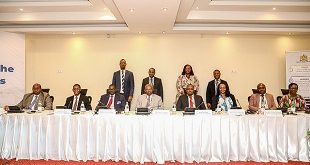
Khartoum, Sudan | AFP | A network of Sudanese journalists went on strike Thursday in the wake of deadly protests sparked by a hike in bread prices, while opposition groups called for further rallies.
Angry crowds have taken to the streets in the capital Khartoum and several other cities since December 19, leading to a crackdown by security forces in which a disputed number of protesters have been killed.
“We declare a three day strike from December 27 to protest against the violence unleashed by the government against demonstrators,” the Sudanese Journalists’ Network said.
Sudanese authorities say eight protesters have been killed in clashes, but Amnesty International has put the death toll at 37.
The Popular Congress Party — a faction in President Omar al-Bashir’s government — says that 17 people have been killed and 88 wounded in the clashes.
Journalists in Sudan frequently complain of harassment by the authorities.
Entire print runs of newspapers are often confiscated over articles deemed offensive by the powerful National Intelligence and Security Service (NISS), which is spearheading the current crackdown on protesters.
— More protests urged —
Activists and opposition groups have called on people to take to the streets again over the next few days.
“We urge the Sudanese people to continue their demonstrations until success is achieved by overthrowing the regime,” the Sudanese Communist Party said in a statement.
Several members of the party have been arrested by security agents since the protests started.
“We also call on all opposition parties to unite and work together to coordinate this movement.”
Adding to pressure on Bashir’s governing alliance, a minister in Northern State’s provincial administration resigned on Thursday.
The resignation by the province’s health minister Abdarouf Grnas — from the Umma Reforms Party, part of Bashir’s embattled governing alliance — is the first by a notable official since the deadly protests erupted.
“We have one minister in North State and we decided to withdraw him because of the violence against protesters,” Mubarak El Fadiel, the head of the Umma Reforms Party, told AFP.
“This is the first step and it will be followed by other steps,” Fadiel said, without specifying what those steps would be.
Umma Reforms Party is a political faction that broke away from the country’s main opposition National Umma Party led by Sadiq al-Mahdi, a former premier who was toppled by Bashir in a 1989 coup.
Police and security officers remained deployed in several parts of the Sudanese capital on Wednesday, but for the first day in a week no new demonstrations were reported.
Protests initially started in towns and villages and later spread to Khartoum, as people rallied against the government raising the price of a loaf of bread from one Sudanese pound to three (from about two to six US cents).
 The Independent Uganda: You get the Truth we Pay the Price
The Independent Uganda: You get the Truth we Pay the Price



